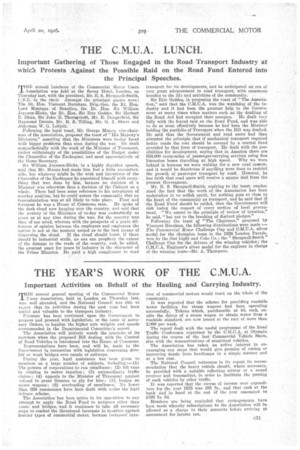Important Gathering of Those Engaged in the Road Transport Industry
Page 15

If you've noticed an error in this article please click here to report it so we can fix it.
at which Protests Against the Possible Raid on the Road Fund Entered into the Principal Speeches.
THE annual luncheon of the Commercial Motor Users Association was held at the Savoy Hotel, London, on 'Thursday last, with the president, Mr. E. S. Shrapnel-Smith, C.R.E. in the their. • Amongst the principal guests were: Thie Rt. Hon. Viscount Burnham, Brig.-Gen. the lit. Hon. Lord Montagu of Beaulieu, the Rt. Hon. Sir William Joynson-Hieks, the Rt. Hon. Sir Eric .Geddes, Sir Herbert E. Blain, ;Sir John E. ThorneTcroft, Mr. E. Dangerfield, Sir Raymond Dennis, Mr, R. S. Tilling, Mr. G. J. Shave and Alderman W. G. Lobjoit.
Following the loyal toast, Mr. George Munro, vice-chairman of the Association, proposed the toast of "His Majesty's Ministers," asserting that the Ministers were to-day faced with bigger problems than e%'= during the war. He dealt sympathetically with the work of the Minister of Transport, rather criticisingly of the possibilities of the Budget under the Chancellor of the Exchequer, and most appreciatively of the Borne Secretary, Sir William Joynson-Hicks, in a highly dignified speech, said that Mr. Munro had made him feel a little uncomfortable, but whatever might be the wish and intentions of the Chancellor of the Exchequer he associated himself with everything that was done by him, because no decision of a Minister was otherwise than a decision of the Cabinet as a whole. There had been some reference to his acceptance of another position; but he could assure the community that no traesplantation was at all likely to take place. First and foremost he was a House of Commons man. He spoke of the dark cloud now hanging over the country, and said that the anxiety Of the Ministers of to-day was undoubtedly as great as at any time during the War, for the countrj,was then of one mind, whereas with the prospects of a grave differeece of opinion between the employers and employees the eation is not at the moment united as to the best means of dispersing the cloud. If the cloud should burst. if there should be industrial strife, no one can prophesy the extent of the damage to the trade of the country, and, he added, the greatest asset for peace in industry is the character of the Prime Minister. Be paid •a high compliment to road transport for its developments, and he anticipated an era of very great advancement in road transport, with enormous benefits to the lifa and activities of the community. • Sir Eric Geddes, in proposing the toast of "The Association," said that the C.M.U.A. was the watchdog of the industry and it had been the greatest help to the Government at many times when matters such as the drafting of the Road Act had occupied their energies. He dealt very fully with the feared raid on the Road Fund, and was able to do so most effectively because he had been the Minister holding the portfolio of Transpert when the Bill was drafted. He said that the Government and road users had then accepted the principle that if mechanical transport required better roads the cost should be covered by a central fund provided by that form of transport. He dealt with the possibilities for development, saying that in America there are 566,000 route-miles of passenger-carrying services using fine limousine buses travelling at high speed. Why we were behind is because we were waiting for -a new road syletem, and it would be disastrous if anything were done to restrict the growth of passenger transport by road. However, he • has faith that road users will receive a square deal from the present Government.
_ Mr. E. S. Shrapnell-Smith, replying to the toast, emphasized the fact that the work of the Association has been undertaken in no selfish spirit, for nothing goes so close to the heart of the community as transport, and he said that if the Road Fund should be raided, then the Government will risk losing the respect of every section of local government. "We assent to the principle of "review of taxation," he said, "but not to the breaking of distinct pledges." Following the toast of "The Chairman," proposed by Viscount Burnham, the following distributions were made :— The Commercial Motor Challenge Cup and C.M.U.A. silver medal for the champion team in the 1926 London Parade, won by the Gas Light and Coke Co.; the " Shrapnell-Smith" Challenge Cup for, the drivers of the winning vehicles; the C.M.U.A. Engineer's silver medal "for the engineer in charge Of the winning team—Mr. A. Thompson,
































